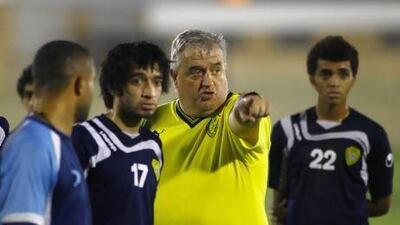Albert Benaiges is talking a little politics before we begin, although as he is speaking in Spanish and what he is saying is translated twice over (into Arabic and then English), much of the nuance is lost.
He is a Catalan, that much he makes clear, and he has a few thoughts on the Spanish monarchy. (Not bad.)
Benaiges has been in Dubai for over a year, heading what is one of the most exciting experiments in Gulf football, as the head of the youth academy at Al Wasl.
The idea is simple: can one of the men behind Barcelona's La Masia academy extract the ideas that make Barcelona and Spain tick and implant them into a region ripe for stirring up.
It is an ambitious plan but things are going well. "There's been an improvement in the way players have started to adapt to the way that we are trying to implement, when it comes to training and the matches," Benaiges says.
"Slowly we're seeing the execution of the type of play that we want, starting from the back, building it from there, very similar to the Barca style and the national team as well. Here they were used to the English direct football style but this is now picking up in the academy."
And as players have begun to learn from him, so too has he started to learn about them, their habits, the region and its footballing culture.
The eating habits of players, he has come to see, like so many before him, need to be monitored.
"I feel the kids here are not getting the right nutrition, and the right food," he says. "Most of the kids are allowed to eat junk food, especially when they go to the malls here."
And he is surprised that parents of young footballers do not often come to training sessions or academy matches to watch their children.
"In Europe 90 per cent of parents attend to watch their progress, to watch them train or play matches," he says. "Here 90 per cent don't come. Maybe only three families come. Kids are attending from the ages of 13 onwards but only three families out of a lot? It's good to have them for their support, to make them feel that this is important."
Benaiges arrives to Gulf football at a strange, pivotal time. Although standards have improved, they have not improved as much as in countries such as Japan and South Korea.
With Australia now part of Asian football, and central Asian countries such as Uzbekistan also in the region, there are suddenly challengers who are more exposed and equipped to perform on a global platform.
Here Benaiges understands there are some unique challenges.
"One, there is a saying in Spain that the more the quantity, the more the quality," he says. "So when you have a larger number of players, the chance of getting quality are higher.
"When you have a limited or smaller pool then it is more difficult. There are only 14 teams in the UAE and not all players are Emirati, so if you want to take the best out of these, you'll only have a handful.
"Another is that the standard of living is pretty high for these players. They are born into a high standard of living, as opposed to players in Argentina, Brazil, even Spain, where football is a means to a better life.
"So you'll find a lot of thirst or hunger there, in being able to reach top level, so the commitment is greater."
He has seen talent beyond Wasl and around the UAE, and not just Al Ain's Omar Abdulrahman. (When asked about him, Benaiges hears the name and motions with his hands the midfielder's distinctive curly, longish hair and frail body: "He is a big talent but I have seen others as good as him at Al Shabab, Al Nasr and Al Jazira.")
But differences in regulations governing academies has also meant it is difficult to assess comparative levels.
"Our academy fixes matches with other academies from around UAE, but the rules are different," he says.
"In Dubai for instance, it is very difficult for you to take on a young player from Africa. They will not allow you to register him whereas in Abu Dhabi the laws are more lenient so you can reinforce your team with skilled youngsters from different countries.
"The level is different, probably higher when it comes to academies in Wahda, Jazira and Al Ain."
He is hesitant to put a time line on when the inception of his ideas here will bear tangible results - and that is always the key equation in UAE football, results against the time needed to invest in them. But it might not be for a while yet.
"If you look at the current Barcelona side most are graduates of La Masia and if you look at the years players like Carlos Puyol, Xavi, Andres Iniesta, Lionel Messi and Cesc Fabregas were born, it took them some time to reach the first team," he says.
"So if you talk about the age group here [at Wasl], those who are born between 1992 and 1994, and you want them to play in the first team, that might not be possible.
"It's medium to long-term planning that needs to be in place.
"But if we look at those born from 1995 onwards, that is the group that we are working on, probably eight to nine players that can be taken further from there."
Follow us

